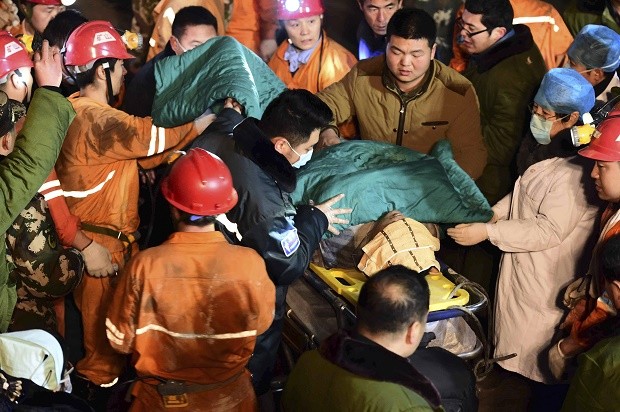
In this Dec. 25, 2015 photo released by China’s Xinhua News Agency, a trapped miner is rescued from a collapsed gypsum mine in Pingyi County, east China’s Shandong Province. Chinese rescuers pulled more than 10 workers to safety and located another workers who were trapped after a mine collapsed in the eastern province of Shandong, state media said Saturday. AP
BEIJING, China — The owner of a Chinese gypsum mine drowned after jumping into a well in an apparent suicide during rescue efforts for 17 workers still trapped two days after the mine collapsed and killed one person, state media said Sunday.
Quoting a morning briefing by the rescue command center, state media said Ma Congbo, president of Yurong Commerce and Trade Ltd. Co., was assisting with rescue efforts on Saturday morning when he jumped into a mine well and drowned.
Since the mine collapse on Friday, rescuers have pulled 11 workers to safety and recovered one body. Another 17 miners are yet to be found.
Gypsum is a soft sulfate mineral that is widely used in construction.
Chinese authorities have typically meted out harsh punishments, including jail sentences, to company management and local work safety officials following major work safety disasters. Still, lack of regulatory oversight prevails, and cost-conscious management fails to pay enough heed to work safety.
The mine collapse came just days after a landslide from a man-made pileup of construction waste in the southern city of Shenzhen killed one person and left another 75 missing and presumed dead.
Authorities have ruled that the landslide was not a geological disaster but a work safety incident, adding to China’s list of major man-made disasters in recent years.
In a rare move, Shenzhen’s top officials, including its party chief and mayor, bowed deeply at a press conference as an apology.